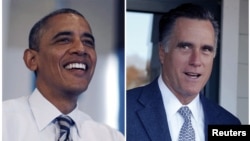Daunting issues await the winner of Tuesday's U.S. presidential election, whether it is Democratic incumbent President Barack Obama or his Republican challenger, Mitt Romney.
The new American president will not be sworn into office for a four-year term until January 20, 2013.
But Obama will have to deal with a variety of contentious tax and spending issues before the end of 2012. The president and lawmakers in Congress delayed key decisions until after the election, but now will have only a few weeks to deal with them.
If Romney wins the election, even before he assumes office, he could play a key role in deciding whether to extend key tax rates that affect virtually all workers in the U.S. In addition, Congress has to decide whether to cut spending, and to what extent, on numerous defense and domestic programs.
As the cumulative U.S. government debt total continues to mount, the U.S. will also face a decision early in 2013 whether to increase the amount the country can borrow beyond the current $16 trillion level. In addition, both candidates have pledged to work for a plan that would reduce the debt level over a period of years, but debates on the issue have proved contentious in recent years.
Underlying the tax and spending issues are questions about how to boost the American economy. The U.S. economy, the world's largest, is advancing, but only sluggishly as the country recovers from the depths of the recession in 2008 and 2009, the country's worst downturn since the Great Depression of the 1930s.
Overseas, the president over the coming months will be faced with winding down the U.S. involvement in its longest war, against the Taliban in Afghanistan, without leaving the region a more dangerous place. Obama has pledged to bring troops home by the end of 2014.
The U.S. role in curbing development of Iran's nuclear program remains at the heart of American concerns in the Mideast, along with protecting the security of Israel and ending the violence in Syria.
No matter who wins the election, the American government will also face a generational change in leadership in China, the world's second biggest economic power. Washington and Beijing have often sparred over trade and monetary issues.
The new American president will not be sworn into office for a four-year term until January 20, 2013.
But Obama will have to deal with a variety of contentious tax and spending issues before the end of 2012. The president and lawmakers in Congress delayed key decisions until after the election, but now will have only a few weeks to deal with them.
If Romney wins the election, even before he assumes office, he could play a key role in deciding whether to extend key tax rates that affect virtually all workers in the U.S. In addition, Congress has to decide whether to cut spending, and to what extent, on numerous defense and domestic programs.
As the cumulative U.S. government debt total continues to mount, the U.S. will also face a decision early in 2013 whether to increase the amount the country can borrow beyond the current $16 trillion level. In addition, both candidates have pledged to work for a plan that would reduce the debt level over a period of years, but debates on the issue have proved contentious in recent years.
Underlying the tax and spending issues are questions about how to boost the American economy. The U.S. economy, the world's largest, is advancing, but only sluggishly as the country recovers from the depths of the recession in 2008 and 2009, the country's worst downturn since the Great Depression of the 1930s.
Overseas, the president over the coming months will be faced with winding down the U.S. involvement in its longest war, against the Taliban in Afghanistan, without leaving the region a more dangerous place. Obama has pledged to bring troops home by the end of 2014.
The U.S. role in curbing development of Iran's nuclear program remains at the heart of American concerns in the Mideast, along with protecting the security of Israel and ending the violence in Syria.
No matter who wins the election, the American government will also face a generational change in leadership in China, the world's second biggest economic power. Washington and Beijing have often sparred over trade and monetary issues.




